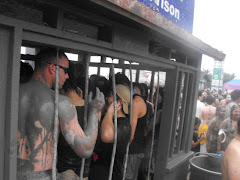Monday, August 31 at 9:05am
In case you're not keeping score, I'm at the four month mark or approximately 1/3 of my time here in Korea. Sad in a way, but also a milestone and perfect time for reflection of the past four months.
Overall, my time continues to be enjoyable, and I remain pleased with my decision to live/teach here. I have learned many things and met many interesting people in the past four months. In fact, it's been so good I am almost certain I will return for a second year once my contract expires in April 2010. I will, of course, travel home for a one to two month visit in the states prior to starting any new teaching contract. Also, I will most likely seek location in another community so as to see/experience more of the country.
Things I have learned in only four short months:
Korea can be a very affordable place to live. Especially if your rent is paid for, as is the case with many ESL positions. Food is my largest expense (5,000-10,000 Won per meal is average), followed by beer consumption (2,500-6,000 Won per beer depending on the bar), though you can always catch a cheap buzz off a bottle of soju or makgeolli (1,500-2,000 Won) at any convenience market, and they sell it 24 hours a day. There is no apparent limit to how much or when one can drink. It's game on 24-7 if you want, which explains why alcoholism is so prevalent in Korean society.
Furthermore, I am pleased to announce I have actually saved some money during my short time here; roughly 25-40% of my income over the past four months. I have also incurred some expenses, thus dipping into my savings; e.g. trips to the hospital (prior to health insurance), weekend travel excursions, camping equipment, guitar lessons, furniture for the apartment, etc. It's all good though, as I have managed to have a great time, travel lots, and still have millions of Won in the bank. Yes, I said millions.
Teaching continues to go well. I seem to be good at it, and more importantly, I actually enjoy it and really try hard to improve every day. The school and I have had our minor issues, mostly stemming from the fact I do not like to use the textbook in class, prompting some students to try and return it for for a full refund (30,000 Won). The school, I am sure, makes a tidy profit off the books they sell, but unfortunately the books are complete crap. First of all, they are written in a very childish manner, and they do not explain things well or introduce useful terms or phrases. The bulk of my teaching material actually comes from the internet (newspaper articles, worksheets, pronunciation guides, lists of idioms, metaphors, expressions, etc.). It is for this very reason that the school has scolded me numerous times for the number of copies I make each month. Apparently, they are keeping track, as I was told, and shown, I copy twice the number of paper as the other teachers. My reaction, "Really? That's great news! Do I win a prize?" was not met with the same enthusiasm I had hoped for.
As I have stated previously, I really love the students. Because I mostly teach adults, we have some very intellectual discussions on a variety of topics ranging from politics, economic issues, global affairs, cultural differences, travel, books, music, movies, food, sex, drugs, etc. I try to avoid religious discussions in class, and I usually have issues whenever students introduce this topic. Practicing introductions using different greetings is a popular exercise in Ethan's class, as is in-class debates on pre-determined topics. Newspaper articles featuring current stories can be a wonderful teaching instrument, as it allows the students to practice reading aloud (thus assisting with their pronunciation), and provides a topic which the students often find interesting and can comment freely on. Some of the best discussions in recent weeks have been in Business English class. Our topic has been innovation, embracing technology, and how we can incorporate this change into our daily lives, as well as make money doing it. This week in Business English class we will also be completing a case study on the competitive advantage of Starbucks in Korea. All fascinating stuff.
In four months teaching, I have learned students come and students go. Some of these students have become good friends, and others remain friendly acquaintances I sometimes see when traveling in Sanbon or other neighboring communities. Because Sanbon is such a small town, it's easy to see and be seen. Just this week I ran into Sung, 36 year old student and veterinarian from my Monday/Wednesday morning class, while shopping late night at E-Mart. His timing was perfect, actually, as I was in the midst of trying to ask the E-Mart staff where the paper towels were and there was a noticeable communication breakdown. Instead of paper towels, they kept leading me to the toilet paper section. "Ani-o (No), kitchen towels!" Last week, I also had a young waitress introduce herself in the restaurant she was working after she recognized me as one of the teachers at her school. It's good to be recognized. Just hope you are not doing anything too awkward when they see you.
Obviously, most of my friends here are foreign teachers, as we can share stories about our experiences and relate to each other best. I have also befriended some Korean teachers from my academy and other academies. In other words, my closest friends seem to be those with whom I surround myself on a regular basis. Because I am not the clubbing type, I have avoided this part of the Korean experience which many of the younger folk seem to enjoy. This, and the best clubs are in Seoul or other larger cities that require an expensive taxi ride to/from. I am too cheap for this and I would rather indulge myself closer to home at one of the many bars located in Sanbon. I suppose I should get out more. Perhaps I am getting old, or I am just lame. Regardless, I am content with my social life for the most part. I do, however, want to travel to Seoul or somewhere outside Sanbon to listen to live music, especially one of the many jazz bars I have read about.
Other observations:
There are many bookstores located in Seoul and other cities featuring English books. Obviously, they can be very expensive to purchase. The library, however, offers an excellent alternative to this and should be enjoyed by more people. Just last weekend, I introduced my South African friend Marguerite to the Sanbon library. She had never been, and didn't even know it existed.
Almost all Koreans can speak or understand some English. Despite this, it is rare for a Korean to engage in conversation with a foreigner. They often are too nervous or are not confident in their abilities to attempt this. I have found you get the occasional, "hello" or, "where are you from" in passing, but usually you need to: 1) look incredibly lost or confused, or 2) initiate conversation with a Korean. Koreans also seem to enjoy it when you actually try to speak the language. It shows you are making some form of an attempt, and it can go a long way toward earning their respect. In my experience, people usually ask, "how long have you lived here" and they are often amazed with my limited vocabulary (60-70 words?) and pronunciation following only four months. Not bad.
Simply because us foreigners look different than everyone else, I will often get stared at. This happens almost everywhere I go; in the elevator, riding the subway, walking down the street, eating in a restaurant, drinking at a bar, shopping at a store, etc. Young children are chronic offenders, but I suppose this can be cute in a way. After week two, I probably became immune to this, as there is nothing to do about it. Accept it and embrace it. Show off and act colorful. If anyone disproves of your behavior, tell them you're from Canada.
There are many, many foreigners living in South Korea. Over 1.1 million, in fact, or roughly 2.2% of the country's population. Because the country spends so much money trying to learn English (estimated 20 trillion Won or $20 billion U.S.D. in 2006), almost every school and every hagwon has at least one native English teacher. In Sanbon, I usually encounter one foreigner per day. In larger cities, it is common to find many foreigners. And strangely, there is no secret handshake or obligatory greeting. Usually a head nod, or a "hey" or "what's up" is most common. I do feel sorry for Dylan, the poor guy from Canada who was the first way-guk (foreigner) I saw on my third day in Korea. I'm sure I freaked him out as I stared at him for the longest time while he was playing basketball with his young Korean students at the park. I eventually approached him and introduced myself before he asked me what my f***ing problem was. Fortunately, he was receptive to my bewilderment after I explained it was only my third day and he was the first foreigner I had seen. Ah, yes, the good old days when I didn't know a soul, the language, or much of anything here.. It seems like only yesterday..
It goes without saying that the people here are friendly, for the most part. There are always exceptions to this, as your bound to find a few bad apples in every bunch. While I cannot say these individuals were rude or mean, they were, perhaps, short tempered, or better yet, they were not as patient as others I have met. Examples of this include some shopkeepers who did not seem to like foreigners, or perhaps were just too busy to provide the type of customer service we Americans seem to demand. Another example are the older (usually 60+ years age) Korean women, who are notorious for pushing their way through crowds, onto elevators and subways when the doors first open, etc. Even the students I have spoken with consider this sometimes rude, but it also accepted as common practice for these older women to behave in this way. The explanation I was told is they did not have the same economic and educational opportunities as younger generations, and they do not fully understand the changes (western influences or "westernization") which have occurred in the country over the past thirty years.
Koreans generally like to push their way through crowds and are not as respectful of personal spaces as other Western nations. It's the Confucian way. This becomes a bit much at times, especially for someone who tends not to like large crowds and very much enjoys his "personal space." Because the country is so limited in size; surrounded on three sides by oceans and a hostile country to the North, they do not value personal space as much as America, for example. Perhaps it is for this reason that nearly half the country's population resides in the metropolitan Seoul area, some 20+ million residents. Also, many of their homes, especially in newer communities, are large apartment towers filled with hundreds, if not thousands of residents.
Other "minor" irritations include Korean children, who I swear can yell or scream louder than any other children when they cry. The children are not the issue, it's often the parents who allow others to suffer through this painful display of unpleasantness. Also, I have seen many Korean children running around restaurants, Starbucks, and other places you would expect their parents to demonstrate more control over their children. One more item on the topic of children, and something I have mentioned in past updates, is the appalling fact that many parents do not use child seats in their cars. Instead, the children sit on parent's laps (sometimes in the font seat) or freely in the backseat without any type of a safety harness. In the event of a crash (highly likely based on the way many people drive), the child will most assuredly be injured or killed. I don't understand this.
Please don't misinterpret my comments above. I like it here very much and the people are, in fact, a charming bunch and are very friendly. I only provide this information for the readers of this blog to learn more about the country and my observations living here. Besides, I have recently shared this blog address with select students and I don't want them to misunderstand me. Since we all have our good and bad days, and sometimes, even Ethan-Teacher can be moody, these irritations can get the better of you. What's important to remember is that you are in a foreign land, not your own country, and you must save face. Also, there are many cultural differences that we as foreigners cannot comprehend and, no matter how hard we try, will never fully understand. So relax. Be patient. You're living in South Korea. Make the most of your time here. Enjoy it.
Top 5 Favorite things about Korea:
1) the Food - it's fantastic, it's spicy and it's cheap.
2) the People - especially my students, are wonderful, and their friendship is invaluable.
3) the Mountains - they're everywhere and there is always somewhere new to explore.
4) the Culture - it's what led me here in the first place and a special thanks to Dr. David Nemeth at The University of Toledo. I would never have made the journey without his teachings.
5) the Women - they're truly beautiful and always provide something pleasant to look at.
I hope you find this information of interest and of value. As always, thanks for reading.

























































































































































3 comments:
If you decide to renew your contract, we will surely come visit you. i am really glad things are going well. i love reading these entries, they are really well written. :)
yes i think a smitley/sparrow trip to korea needs to happen. i will chair the committee and start saving my pennies.
wow ethan. that's really interesting i found ur blogger by accident.. i was in ur free talking class and noticed how much ur interested in culture, traveling and ect. but reading ur long story is a bit different feeling w/ listening in the classroom. anyway i just wanted to say hi. cheers. - ilwha
Post a Comment